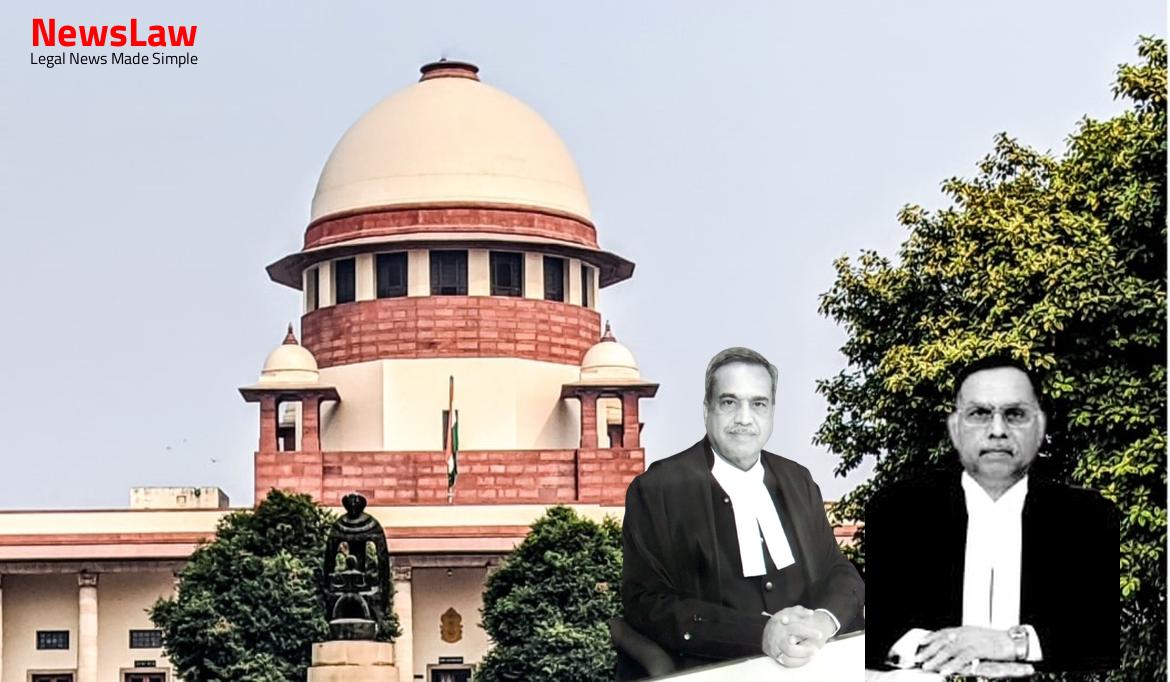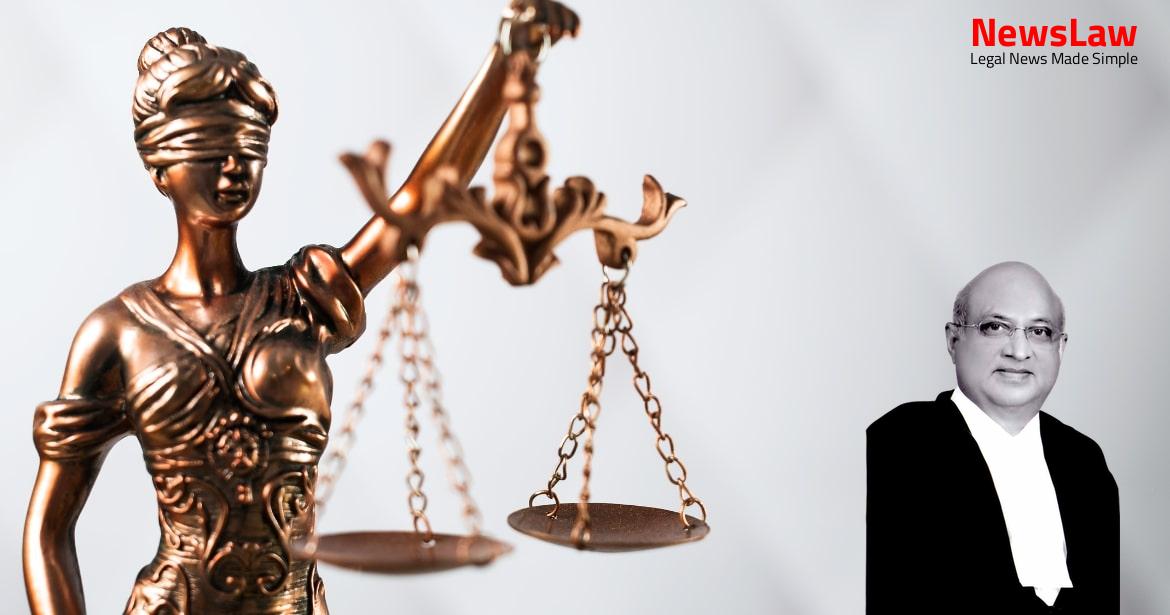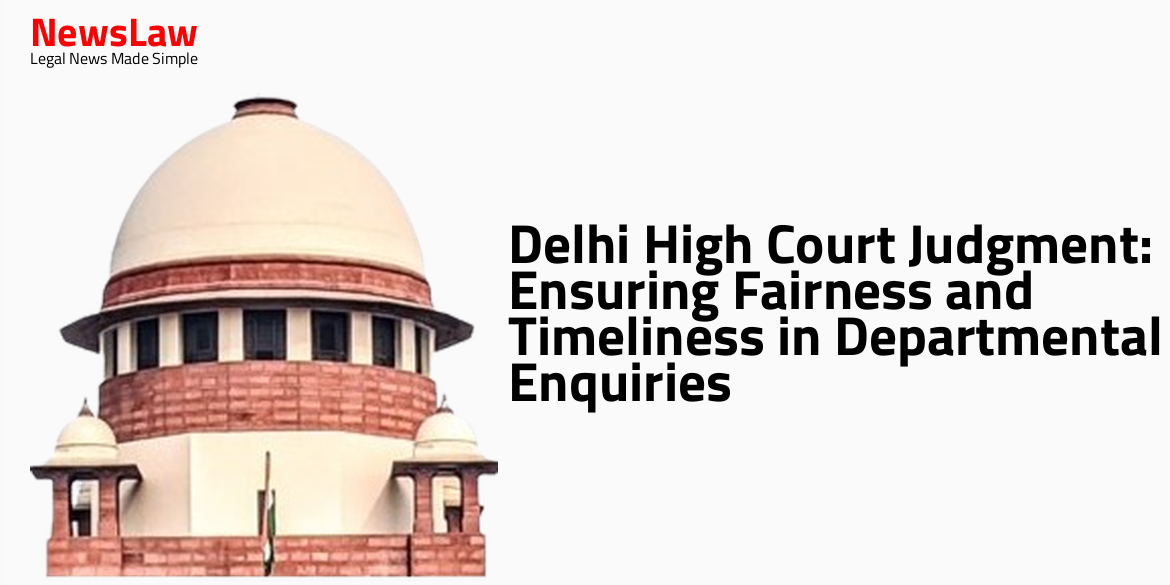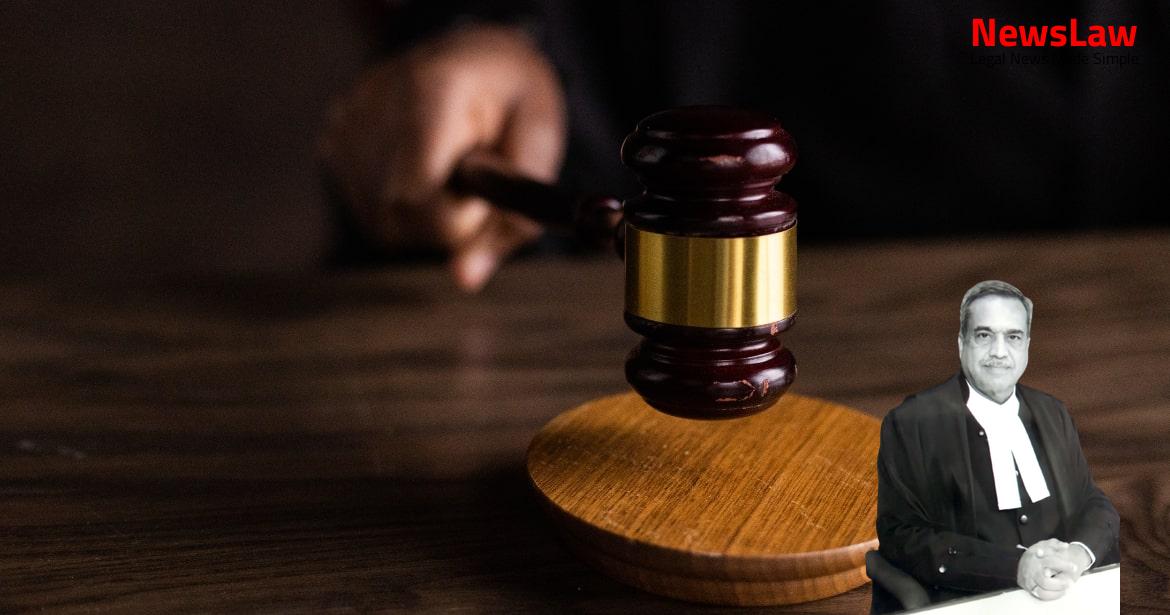Exploring the intricacies of compensation claims under Section 163A of the Motor Vehicles Act, the Supreme Court of India provided crucial insights in the recent judgment on a case involving the liability of vehicle owners. This case delves into the legal precedent and debates surrounding the eligibility for compensation, focusing on the claimants seeking redress against the insurance company of the vehicle involved. Stay tuned for a breakdown of the judgment and its implications in the realm of insurance law.
Facts
- Deceased was traveling on a motorcycle with registration No. RJ 02 SA 7811.
- Claim petition was filed against the insurance company of the motorcycle with registration No. RJ 02 SA 7811.
- Key issues framed by the Tribunal included the cause of the accident, driver’s employment status, compensation entitlement, objections raised in statements, and the relief sought.
- The claimants, who are the original claimants, have appealed against the claim petition.
- Accident resulted in the death of Chotelal alias Shivram.
- The accident was attributed to the rash and negligent driving of the driver of another motorcycle with registration No. RJ 29 2M 9223.
- Claimants only filed the petition against the owner and insurance company of the motorcycle with registration No. RJ 02 SA 7811, not against the driver, owner, or insurer of the other vehicle involved.
- Objection raised by the insurance company of the motorcycle with registration No. RJ 02 SA 7811 regarding the failure to file a claim against the owner of the other vehicle.
- The High Court allowed the appeal by the insurance company and quashed the Judgment and Award of the Motor Accident Claims Tribunal.
- The High Court dismissed the claim petition as it was not filed against the owner of the vehicle involved in the accident.
- The Tribunal held the insurance company of the motorcycle involved in the accident liable to pay compensation under Section 163A of the Act.
- The Tribunal awarded a total sum of Rs.3,67,000 as compensation to the claimants along with 6% interest per annum.
Also Read: Interpretation of Lease Agreement and Compulsory Registration
Issue
- Whether the insurance company of the vehicle driven by the deceased himself would be liable to pay compensation under Section 163A of the Act?
- Whether the deceased, not being a third party to the vehicle No RJ 02 SA 7811, can maintain the claim under Section 163A of the Act from the owner of the said vehicle?
Also Read: Legal Interpretation in Light of Section 148 of NI Act: Revisiting Appellants’ Case
Arguments
- The claimants, who are the original claimants, have filed a claim petition under Section 163A of the Act for compensation.
- In the petition, they sought compensation from the owner and insurer of the vehicle being driven by the deceased at the time of the accident, not the owner of the motorcycle that collided with them.
- The claim is based on the principle of no-fault liability as per Section 163A, which does not require proving fault of the vehicle owner or any other person.
- The deceased, who was not the owner of the vehicle but an employee of the owner, is considered a third party in this context.
- The insurance company argues that the deceased stepped into the shoes of the owner and thus is not entitled to third-party compensation from the insured vehicle.
- Legal precedent, such as the case of Dhanraj v. New India Assurance Co. Ltd., is cited to support the insurance company’s stance.
- It is asserted that Section 163A of the Act places liability on the owner of the vehicle for compensation without the need to establish fault.
- Another case, Naveen Kumar v. Vijay Kumar, is referenced to define ‘owner’ as the registered owner liable despite any sale or transfer of the vehicle.
- The claimants’ appeal emphasizes that the High Court erred in dismissing their claim solely on the ground that they did not file against the owner of the colliding motorcycle.
- The claimants’ petition was valid under Section 163A and sought compensation from the relevant vehicle’s owner and insurer, as per the no-fault liability principle.
- Legal debates regarding insurance coverage for the deceased, and the requirement to prove accident-related death or disablement, are discussed in reference to Oriental Insurance Co. Ltd. v. Rajni Devi.
- The claimants had the option to file the claim under fault liability against the owner of the colliding motorcycle but chose the no-fault liability route against the owner of the vehicle being driven by the deceased.
- The borrower of the vehicle, who is the deceased in this case, is suggested to have stepped into the shoes of the owner, impacting the claim for compensation.
- The insurance company maintains that the deceased being an employee of the vehicle owner does not qualify for third-party compensation.
- Various sections of the Motor Vehicles Act are interpreted to emphasize the liability of the vehicle owner for compensation as per Section 163A.
- The amendment to the 2nd Schedule specifying fixed compensation of Rs. 5 lakhs in case of death is not applicable retrospectively.
- Parties will be governed by the terms and conditions of the insurance contract.
- Claimants may be entitled to Rs. 1 lakh only as per the terms of the insurance contract.
- The accident occurred in 2006, the Tribunal’s Judgment was in 2009, and the High Court’s Judgment in 2018 all happened prior to the amendment in the 2nd Schedule.
Also Read: Enhancing Compensation and Modifying Sentences: A Legal Analysis
Analysis
- After considering various previous court decisions, it was concluded that the liability under Section 163A of the Act lies with the owner of the vehicle.
- A person cannot simultaneously be a claimant and a recipient under this section.
- The heirs of the owner were not eligible to maintain a claim under Section 163A of the Act.
- Previous rulings in cases like Ningamma v. United India Insurance Co. Ltd. and New India Assurance Co. Ltd. v. Sadanand Mukhi also supported the stance that the owner or their legal representatives cannot claim in accidents where there was no negligence by the insured vehicle.
- The recent decision in the case of Ashalata Bhowmik emphasized that parties will be bound by the terms and conditions of the insurance contract.
- Rajni Devi decision clarified that Section 163A of the Act does not apply when the owner of the vehicle is involved in the accident.
- The claim under Section 163A of the Act was made only against the owner and insurance company of the vehicle which was being driven by the deceased himself as a borrower of the vehicle from the owner.
- The deceased is considered to have stepped into the shoes of the owner of the vehicle, hence Section 163A of the Act does not apply when the owner is involved.
- The claimants were not entitled to the benefit of the amendment to the 2nd Schedule of the Act, which specified a fixed amount of compensation in case of death.
- In a claim under Section 163A of the Act, negligence does not need to be established, only that the death occurred in a vehicular accident while driving a vehicle.
- The High Court correctly held that the claimants should have filed the claim petition against the owner of another vehicle whose driver was negligent rather than the owner and insurance company of the deceased’s borrowed vehicle.
- No evidence was presented to prove that the deceased was in employment of the vehicle owner, therefore the claim for compensation under Section 163A of the Act was not permissible.
- The deceased could not maintain a claim under Section 163A of the Act against the owner/insurer of the vehicle he borrowed, as he would be in the shoes of the owner.
- The liability of the insurance company in this case would be in respect of third parties only, not the deceased who borrowed the vehicle.
- The claimants failed to file a claim under Section 163A against the driver, owner, and insurance company of the true offending vehicle involved in the accident.
- The deceased, as the borrower of the vehicle, is entitled to a sum of Rs.1 lakh in case of personal accident, as per the contract of insurance.
Decision
- The present appeal is prayed to be dismissed or partly allowed to the extent of Rs.1 lakh as per the terms of the insurance contract.
- As per the contract, the insurance company is liable to pay compensation to a third party and not to the owner, except up to Rs.1 lakh.
- The original claimants are entitled to a sum of Rs.1 lakh with 7.5% interest per annum from the date of the claim petition till realization.
- No costs are awarded in this case.
Case Title: RAMKHILADI Vs. THE UNITED INDIA INSURANCE COMPANY (2020 INSC 11)
Case Number: C.A. No.-009393-009393 / 2019



